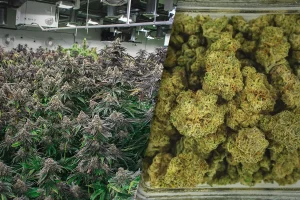
Mastering the Cannabis Harvest: Pro Tips for Cutting, Trimming, Curing, and Storing Your Crop
The harvest season is the most anticipated time for cannabis growers — when months of careful cultivation finally pay off. But cutting down the plants

Cannabis is a complex plant with a rich history of medicinal and recreational use. Over recent years, scientific research has shed light on the intricate interactions between the various compounds found in cannabis, particularly through what is known as the “entourage effect.” This phenomenon refers to the synergistic interaction between cannabinoids, terpenes, and other phytochemicals, which together enhance the overall therapeutic effects of the plant. Understanding the entourage effect is key to appreciating how different cannabinoids and terpenes work together to influence the human body.
Cannabinoids are the primary active compounds in cannabis, with THC (tetrahydrocannabinol) and CBD (cannabidiol) being the most well-known. However, the cannabis plant contains over 100 different cannabinoids, each with its unique properties. While THC is known for its psychoactive effects and CBD for its calming and anti-inflammatory properties, other cannabinoids also play significant roles in the entourage effect:
While these cannabinoids each have individual effects, their interaction with each other and with other compounds in the plant leads to the entourage effect, where the combined impact is greater than the sum of its parts.
Terpenes are aromatic compounds found in many plants, including cannabis. They are responsible for the distinctive smells and flavors of different cannabis strains, but their role extends far beyond just aroma. Terpenes interact with cannabinoids and the body’s endocannabinoid system, influencing the overall effects of cannabis.
Some of the most prominent terpenes in cannabis include:
Terpenes do not work in isolation. Their interaction with cannabinoids is what amplifies the therapeutic potential of cannabis. For instance, myrcene’s ability to enhance cell permeability may help THC and CBD cross the blood-brain barrier more efficiently, leading to more pronounced effects. Similarly, the anti-anxiety properties of linalool can complement the calming effects of CBD, creating a more balanced and effective therapeutic outcome.
The concept of “full-spectrum” cannabis products is based on the entourage effect. These products contain a wide range of cannabinoids, terpenes, and other plant compounds, rather than isolating a single cannabinoid like THC or CBD. The idea is that by preserving the full range of natural compounds found in cannabis, the product can offer a more complete and effective therapeutic experience.
Studies have shown that full-spectrum cannabis extracts can be more effective than isolated cannabinoids, particularly for conditions like chronic pain, inflammation, and anxiety. This is because the various compounds work together to enhance each other’s effects, creating a more potent and well-rounded therapeutic profile.
For example, a full-spectrum CBD product that includes trace amounts of THC, along with terpenes like linalool and myrcene, may provide better relief from anxiety and pain than a pure CBD isolate. The THC can enhance the pain-relieving effects of CBD, while the terpenes contribute to a calming and relaxing experience.
The entourage effect is a fascinating and complex phenomenon that underscores the importance of the whole plant in cannabis-based therapies. While individual cannabinoids like THC and CBD have garnered much attention, the interactions between these compounds and terpenes are what truly unlock the full therapeutic potential of cannabis. As research continues to explore the intricacies of the entourage effect, it becomes increasingly clear that the future of cannabis medicine lies in embracing the full spectrum of this remarkable plant.

The harvest season is the most anticipated time for cannabis growers — when months of careful cultivation finally pay off. But cutting down the plants

Is THCA legal? Explore the fast-evolving U.S. debate over hemp-derived THCA, including industry divide, consumer safety, regulations, economics, and outlook. What is THCA, and why

As cannabis cultivation continues to expand in legal markets, growers are increasingly facing one of nature’s toughest challenges… extreme summer heat. Unlike indoor grow operations

As cannabis becomes increasingly mainstream in the United States, confusion still reigns over the difference between marijuana and hemp, two forms of the same Cannabis

Big changes are blooming at NuVue Pharma — and it’s all good news for your wallet. We’ve heard your feedback and looked closely at how

Despite over half of U.S. states legalizing cannabis for medical or recreational use, federal legalization remains elusive. While public opinion strongly favors reform and the

As the U.S. cannabis industry continues to thrive, driven by expanding state-level legalization and the growth of both medical and adult-use markets, new questions are

Day 1: Clue 1: This game is no trick, to find the Easter Egg you must be quick, get too close today, and I might

In a landmark shift for Colorado Springs, NuVue Pharma is set to commence recreational cannabis sales on April 15, 2025. This development follows a series

Colorado’s cannabis industry is poised for significant changes with the introduction of House Bill HB25-1209, titled “Marijuana Regulation Streamline.” This bill aims to enhance regulatory